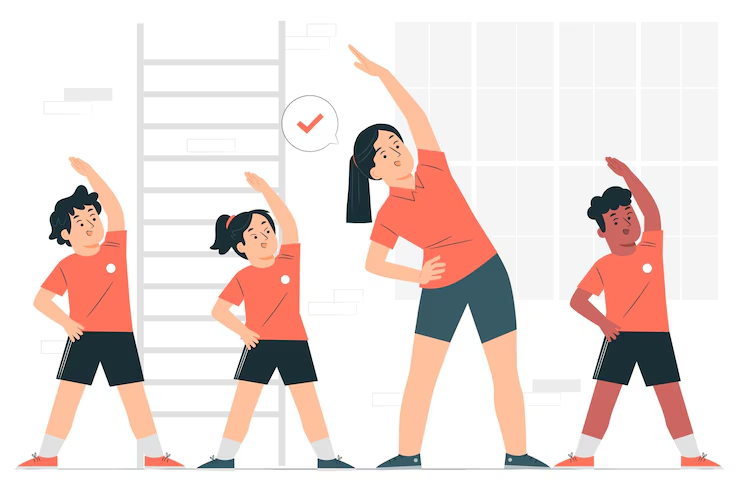BLOG
Importance of Physical Education in Schools

Physical education has been picking up pace of late because of the growing awareness of its benefits on children. Schools have started giving prominence to physical education and are playing a crucial role in encouraging students to involve themselves in any kind of physical activity.
We at New Horizon Gurukul promote and indulge students in physical activities that have improved their overall outcomes. We stress the importance of physical fitness and track the development of children regularly.
This blog talks about the impact of physical education and its role in improving academic performance.
What is Physical Education?
Physical education refers to instructions for the development and taking care of the body. It includes physical exercises, yoga, sports, etc. This is especially taught in schools with a focus to improve the motor skills, physical fitness and promote healthy habits. It is a good way to facilitate teamwork, discipline, flexibility, and endurance.
Benefits of Physical Education in Schools
The extensive benefits of physical education in schools are:
Physical Health Benefits
When children engage in physical activities from a younger age, they develop physical fitness and improve their overall health. Regular physical activity fosters qualities like strength, immunity, and adaptability. It reduces the risk of health issues like obesity, cardiovascular diseases, mental health issues, etc. and aids in maintaining a healthy body weight.
Mental and Emotional Well-Being
Children are often overburdened with academic pressure. Frequent engagement in physical activities reduces anxiety levels, boosts self-esteem and has a calming effect on body and mind. It acts as a release point for stress, thus improving the overall mental health. Physical exercises like sports teach to control emotions and gain mastery over emotional intelligence.
Development of Social Skills
Physical education inculcates qualities like teamwork, collaboration, effective communication, and responsibility. It provides an opportunity to interact with others and foster healthy relationships. They develop important values such as peaceful problem solving, decision-making, integrity, discipline, leadership and sportsmanship.
Role of Physical Education in Academic Performance
Various studies have demonstrated the positive effects of physical education on increased academic performance.
- Physical education increases the attention span of the children.
- It plays a key role in boosting memory and sharpening the mind.
- The reduced stress levels improve the concentration power.
- It maintains a healthy brain and improves cognitive functions.
- The quality of sleep improves, which in turn has a positive impact on understanding and grasping the subject matter easily.
- The discipline developed will help in time management and strictly follow the timetable.
- Students who participate in physical activities show improved levels of learning and retention capabilities.
- A break from studies and engagement in activities improves the information absorption levels.
Promoting Lifelong Fitness Habits
Healthy fitness habits developed during the initial years of life get imbibed in children. It instills lifelong fitness habits and encourages them to maintain active lifestyles beyond school. For example, if a child is into a sport during its school days, it develops passion and tries to include it in the future as well.
Physical education classes teach the students about the importance of maintaining fit bodies, the risks of not involving themselves in physical work, and the benefits of following a healthy diet. These teachings subconsciously penetrate into the minds of children and they make better eating and workout choices.
Physical Education in Indian Schools: Challenges and Solutions
The challenges in imparting physical education in schools are:
- Lack of proper infrastructure like exercising equipment, playground, etc.
- Insufficiently skilled teachers in schools.
- Overemphasis on academics, ignoring the outdoor activities.
- Hesitation and laziness of students to come out of indoors and participate in physical activities.
- Parents fail to encourage children to engage in exercise.
- Lack of awareness about the benefits of physical education.
- Physical education periods are sometimes substituted by academic subjects to complete the syllabus.
- Lack of finances to build sports infrastructure in schools.
To tackle these challenges, schools can implement the following measures:
- Provide adequate infrastructure and materials for sports and physical education.
- Imparting PE training to the teachers or hiring trained teachers only.
- Spread awareness about the positive benefits of physical education on improved academic performance.
- Increase the number of dedicated PE classes per week.
- Motivate the children to take up any sport or extracurricular activities and give them guidance and support.
- Allot a fixed amount of money to improve the condition of sports infrastructure.
- Encourage parents to send their children to dance, aerobics, swimming or any other activity that involves movement.
- Conduct regular competitions to invoke enthusiasm among children and felicitate them.
Conclusion
The significance of physical education in a child’s life cannot be stressed enough. It is beneficial not only for physical well-being but also improves mental health. The potential of PE to enhance academic performance and holistic development has to be realised, and parents should consider joining their children in schools like New Horizon Gurukul that provide and promote quality physical education.
The importance of physical education in schools goes beyond physical fitness—it teaches teamwork, discipline, and stress management. When integrated with yoga practices in schools and a focus on student success factors, it ensures well-rounded development. These activities form a crucial part of holistic education. That’s why many parents prefer best schools in bangalore that go beyond textbooks. New Horizon Gurukul, a leader among top cbse schools in bangalore, exemplifies this approach.
Frequently Asked Questions (FAQs)
Why is Physical Education Important for Students’ Development?
Physical education promotes physical fitness, fosters ethical values, helps in mental and cultural development, reduces stress levels, increases attention span, lays the foundation for career paths, and improves academic performance. This leads to the holistic development of a student.
How does Physical Education Benefit Mental Health?
Regular engagement in physical activities reduces stress levels and improves the quality of sleep. It diverts the children from academic burden and calms their mind. It promotes relaxation and an improved mood. Increased self-esteem and reduced anxiety contribute to positive mental well-being.
What Role does Physical Education Play in Academic Performance?
Physical education boosts memory and improves concentration power. The reduced stress levels and improved sleep quality enhance retention ability. It stimulates the mind and improves brain health, which positively impacts academic performance.
How can Schools Encourage Participation in Physical Education?
Schools should maintain adequate infrastructure like courts, playgrounds, and tracks. They should provide materials like balls, rackets, and bats to evoke interest among children. The benefits of physical education should be taught and regular competitions should be held to encourage students to take up a sport or any other activity.




